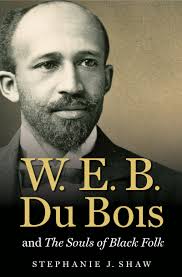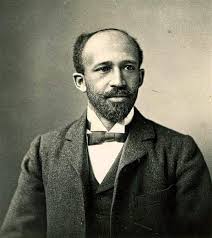The Souls of Black Folk Page #33
The Souls of Black Folk is a 1903 work of American literature by W. E. B. Du Bois. It is a seminal work in the history of sociology and a cornerstone of African-American literature. The book contains several essays on race, some of which the magazine Atlantic Monthly had previously published.
The security offered for such transactions—a crop and chattel mortgage—may at first seem slight. And, indeed, the merchants tell many a true tale of shiftlessness and cheating; of cotton picked at night, mules disappearing, and tenants absconding. But on the whole the merchant of the Black Belt is the most prosperous man in the section. So skilfully and so closely has he drawn the bonds of the law about the tenant, that the black man has often simply to choose between pauperism and crime; he “waives” all homestead exemptions in his contract; he cannot touch his own mortgaged crop, which the laws put almost in the full control of the land-owner and of the merchant. When the crop is growing the merchant watches it like a hawk; as soon as it is ready for market he takes possession of it, sells it, pays the landowner his rent, subtracts his bill for supplies, and if, as sometimes happens, there is anything left, he hands it over to the black serf for his Christmas celebration. The direct result of this system is an all-cotton scheme of agriculture and the continued bankruptcy of the tenant. The currency of the Black Belt is cotton. It is a crop always salable for ready money, not usually subject to great yearly fluctuations in price, and one which the Negroes know how to raise. The landlord therefore demands his rent in cotton, and the merchant will accept mortgages on no other crop. There is no use asking the black tenant, then, to diversify his crops,—he cannot under this system. Moreover, the system is bound to bankrupt the tenant. I remember once meeting a little one-mule wagon on the River road. A young black fellow sat in it driving listlessly, his elbows on his knees. His dark-faced wife sat beside him, stolid, silent. “Hello!” cried my driver,—he has a most imprudent way of addressing these people, though they seem used to it,—‘what have you got there?” “Meat and meal,” answered the man, stopping. The meat lay uncovered in the bottom of the wagon,—a great thin side of fat pork covered with salt; the meal was in a white bushel bag. “What did you pay for that meat?” “Ten cents a pound.” It could have been bought for six or seven cents cash. “And the meal?” “Two dollars.” One dollar and ten cents is the cash price in town. Here was a man paying five dollars for goods which he could have bought for three dollars cash, and raised for one dollar or one dollar and a half. Yet it is not wholly his fault. The Negro farmer started behind,—started in debt. This was not his choosing, but the crime of this happy-go-lucky nation which goes blundering along with its Reconstruction tragedies, its Spanish war interludes and Philippine matinees, just as though God really were dead. Once in debt, it is no easy matter for a whole race to emerge. In the year of low-priced cotton, 1898, out of three hundred tenant families one hundred and seventy-five ended their year’s work in debt to the extent of fourteen thousand dollars; fifty cleared nothing, and the remaining seventy-five made a total profit of sixteen hundred dollars. The net indebtedness of the black tenant families of the whole county must have been at least sixty thousand dollars. In a more prosperous year the situation is far better; but on the average the majority of tenants end the year even, or in debt, which means that they work for board and clothes. Such an economic organization is radically wrong. Whose is the blame? The underlying causes of this situation are complicated but discernible. And one of the chief, outside the carelessness of the nation in letting the slave start with nothing, is the widespread opinion among the merchants and employers of the Black Belt that only by the slavery of debt can the Negro be kept at work. Without doubt, some pressure was necessary at the beginning of the free-labor system to keep the listless and lazy at work; and even to-day the mass of the Negro laborers need stricter guardianship than most Northern laborers. Behind this honest and widespread opinion dishonesty and cheating of the ignorant laborers have a good chance to take refuge. And to all this must be added the obvious fact that a slave ancestry and a system of unrequited toil has not improved the efficiency or temper of the mass of black laborers. Nor is this peculiar to Sambo; it has in history been just as true of John and Hans, of Jacques and Pat, of all ground-down peasantries. Such is the situation of the mass of the Negroes in the Black Belt to-day; and they are thinking about it. Crime, and a cheap and dangerous socialism, are the inevitable results of this pondering. I see now that ragged black man sitting on a log, aimlessly whittling a stick. He muttered to me with the murmur of many ages, when he said: “White man sit down whole year; N*gger work day and night and make crop; N*gger hardly gits bread and meat; white man sittin’ down gits all. It’s wrong.” And what do the better classes of Negroes do to improve their situation? One of two things: if any way possible, they buy land; if not, they migrate to town. Just as centuries ago it was no easy thing for the serf to escape into the freedom of town-life, even so to-day there are hindrances laid in the way of county laborers. In considerable parts of all the Gulf States, and especially in Mississippi, Louisiana, and Arkansas, the Negroes on the plantations in the back-country districts are still held at forced labor practically without wages. Especially is this true in districts where the farmers are composed of the more ignorant class of poor whites, and the Negroes are beyond the reach of schools and intercourse with their advancing fellows. If such a peon should run away, the sheriff, elected by white suffrage, can usually be depended on to catch the fugitive, return him, and ask no questions. If he escape to another county, a charge of petty thieving, easily true, can be depended upon to secure his return. Even if some unduly officious person insist upon a trial, neighborly comity will probably make his conviction sure, and then the labor due the county can easily be bought by the master. Such a system is impossible in the more civilized parts of the South, or near the large towns and cities; but in those vast stretches of land beyond the telegraph and the newspaper the spirit of the Thirteenth Amendment is sadly broken. This represents the lowest economic depths of the black American peasant; and in a study of the rise and condition of the Negro freeholder we must trace his economic progress from the modern serfdom. Even in the better-ordered country districts of the South the free movement of agricultural laborers is hindered by the migration-agent laws. The “Associated Press” recently informed the world of the arrest of a young white man in Southern Georgia who represented the “Atlantic Naval Supplies Company,” and who “was caught in the act of enticing hands from the turpentine farm of Mr. John Greer.” The crime for which this young man was arrested is taxed five hundred dollars for each county in which the employment agent proposes to gather laborers for work outside the State. Thus the Negroes’ ignorance of the labor-market outside his own vicinity is increased rather than diminished by the laws of nearly every Southern State.
Translation
Translate and read this book in other languages:
Select another language:
- - Select -
- 简体中文 (Chinese - Simplified)
- 繁體中文 (Chinese - Traditional)
- Español (Spanish)
- Esperanto (Esperanto)
- 日本語 (Japanese)
- Português (Portuguese)
- Deutsch (German)
- العربية (Arabic)
- Français (French)
- Русский (Russian)
- ಕನ್ನಡ (Kannada)
- 한국어 (Korean)
- עברית (Hebrew)
- Gaeilge (Irish)
- Українська (Ukrainian)
- اردو (Urdu)
- Magyar (Hungarian)
- मानक हिन्दी (Hindi)
- Indonesia (Indonesian)
- Italiano (Italian)
- தமிழ் (Tamil)
- Türkçe (Turkish)
- తెలుగు (Telugu)
- ภาษาไทย (Thai)
- Tiếng Việt (Vietnamese)
- Čeština (Czech)
- Polski (Polish)
- Bahasa Indonesia (Indonesian)
- Românește (Romanian)
- Nederlands (Dutch)
- Ελληνικά (Greek)
- Latinum (Latin)
- Svenska (Swedish)
- Dansk (Danish)
- Suomi (Finnish)
- فارسی (Persian)
- ייִדיש (Yiddish)
- հայերեն (Armenian)
- Norsk (Norwegian)
- English (English)
Citation
Use the citation below to add this book to your bibliography:
Style:MLAChicagoAPA
"The Souls of Black Folk Books." Literature.com. STANDS4 LLC, 2025. Web. 10 Jan. 2025. <https://www.literature.com/book/the_souls_of_black_folk_310>.




Discuss this The Souls of Black Folk book with the community:
Report Comment
We're doing our best to make sure our content is useful, accurate and safe.
If by any chance you spot an inappropriate comment while navigating through our website please use this form to let us know, and we'll take care of it shortly.
Attachment
You need to be logged in to favorite.
Log In